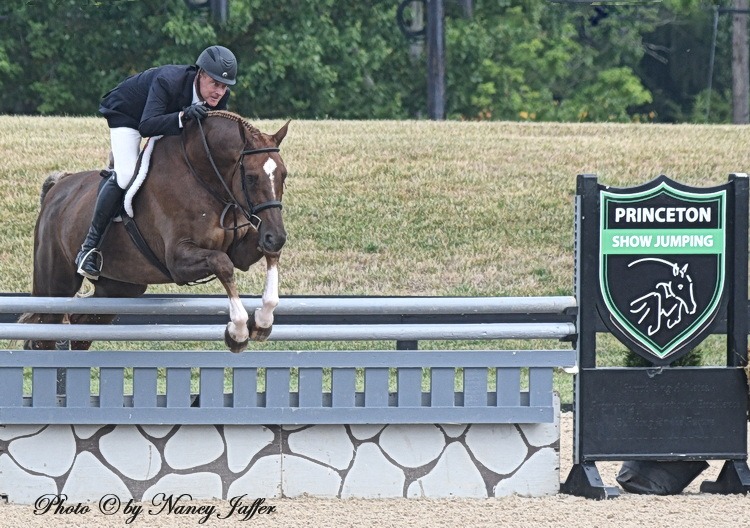
by Nancy Jaffer | Sep 16, 2024
A lack of entries has led Princeton Show Jumping to cancel its three remaining shows for the season, which would have been held this month and in October.
Andrew Philbrick, who runs the hunter/jumper venue in Montgomery Township, N.J., attributes the situation to the proliferation of new shows around his company’s dates. In particular, he mentions three FEI (international) shows geographically close to his competitions that are now on the calendar. They have drawn entries from his shows, he believes, saying in a letter to exhibitors, “Sadly, we do not have enough entries to provide real competition to you or even to pay our staff.”
He contends, “USEF (U.S. Equestrian Federation) horse show entries are down nationwide and profoundly down at many East Coast shows. This is partially due to new migration patterns that include extensive FEI International Horse Shows in Michigan, Lexington, (Ky.), and Tryon (N.C.). In addition to these substantial International Horse Shows, there are new and relatively new FEI Horse Shows at Old Salem, N.Y.; Greenwich, Conn.; Silo Ridge, N.Y., HITS, (Saugerties, N.Y.), and more.”
Unlike what was once the practice in the sport, FEI shows these days also include national level classes for a variety of riders in terms of fence heights and age levels, something that used to be the purview of smaller fixtures.
The letter added, “Princeton seeks to promote and protect a horse and rider development program at our National Shows. We will do our best to survive this new reality, but without a profound change in horse show licensing policy, the future survival of USEF National Shows on the East Coast is genuinely in doubt.”
Expressing concern for the “bottom and middle of the sport because it seems like it’s disappearing,” Philbrick said in an interview he wondered why USEF is “adding so many shows to the calendar when in fact there is no growth.”
Philbrick, a board member of USEF affiliate U.S. Hunter Jumper Association, maintained that “licensing is not transparent; it’s very hard to understand what the process is. I think we need to take a really hard look at licensing.”
Florida trainer Dianna Babington remembers the days when “New Jersey was the backbone of the horse industry, the Team (the U.S. Equestrian Team in Gladstone) was there, the horse was the state animal. There were horses everywhere.”
That abundance of horses that she experienced growing up in New Jersey is no longer the case. The shows that historically were the anchors of the state’s show industry, Middlesex at Johnson Park, Garden State, Monmouth and many others either are diminished or long gone. The void was filled by Princeton at the present-day standard with multiple rings, state-of-the art footing and a wide range of classes.
With the changing migration patterns, trainers who used to base in New Jersey and other states in the region once went to Florida to show, but returned home for the spring, summer and fall. Now if they come back up north, they may rent a few stalls for the summer; more likely, they go to HITS in New York or Traverse City (Michigan) during the summer, then head South, perhaps with stops in Kentucky and Tryon before spending the late autumn, winter and early spring in Florida.
Milford, N.J., trainer Linda Sheridan, who has been competing at Philbrick’s facility for years, notes, “There are too many options now that you can go to. I think he runs a good horse show, he has great footing, he works on getting good course designers. For me, it’s a no-brainer because it’s close and cost-effective, so I don’t have to pay for hotels for grooms and myself. The people there (Princeton) will listen to you if you have something to say.”
Looking at the current show situation, she commented, “The trend is now you have Saugerties with money put into that. I think people have decided that is a popular horse show. Horse shows go in trends (people would go to shows and then stop going, moving on to another town.) HITS came back, they put some money into it. So i think that’s where a lot of people in the New York area go.
“Then Old Salem started running more than just their spring and fall horse shows. I think that took away people from Princeton. I think some of it is a location situation. FEI has become a little bit of a trendy thing; there are people who will go only to FEI shows.”
And that’s even if they are not at the level where ranking points will mean anything for them.
Interestingly, the FEI 4-star $226,000 Sapphire Grand Prix of the venerable Devon Horse Show drew only 23 entries in May, compared with 30 for the $25,000 grand prix at the Devon Fall Classic last weekend which fills a need at a lower level.
On social media, some people commenting about the cancellation said they felt Princeton was expensive in comparison with certain other shows they frequent. But it’s expensive to put on a show. Philbrick noted it takes 50 people “to open our doors” and cites such expenses $250/day for a jump crew member, excluding meals and hotel, as well as $10,000 per week for an international course designer if costs like a rental car and hotel room are included.
Others discussing the situation are choosing shows with more amenities than Princeton, and would prefer to go there even if they were further from home. But Philbrick noted that because Princeton is located on property governed by rules involving the state’s Farmland Preservation Program, use conditions bar construction of such niceties as permanent stabling and restrooms.
Asked whether his facility will hold shows in 2025, he said, “We’re going to survive, but we’re going to take a really hard look at what we’re offering and we’re going to continue to try to get the mileage protection we were originally promised when we built the facility and we’re hoping the USEF responds in kind and wants Princeton to be available to the USEF membership. If they don’t, that will make a decision for us much more clear. The federation at some point needs to work in collaboration with horse show facilities and horse show managers.”
In his letter, Philbrick stated, “Princeton seeks to promote and protect a horse and rider development program at our National Shows. We will do our best to survive this new reality, but without a profound change in horse show licensing policy, the future survival of USEF National Shows on the East Coast is genuinely in doubt.”
He maintained during the interview, “The future does not look bright unless you just think we’re going to be an entire nation of FEI horse shows, which I don’t think we will. Every one of those people who rides at FEI horse shows started at a one-day (show).
“I have pictures of Jessie Springsteen in the short-stirrup in my indoor ring at Hunter Farms from all those years ago. Where do you think she started and got herself successfully on the Olympic team (where she won the team silver medal in 2021)? You’ve got to start somewhere.”
Sheridan remembered the days of “jam-packed” B- and C-rated horse shows in New Jersey.
“That was where people learned how to horse show. You’d take a barn full of your lesson kids or people that don’t have a lot of money. It’s really gone by the wayside now,” said Sheridan.
“I’ve got some really nice young horses and I want to develop them. I want to go to some of the nice `away’ shows, but I want to have a balance and Princeton was really fulfilling that part of the balance.”
The cancelled shows would have been staged Sept. 18-22, Sept. 25-29 and Oct. 3-6. A banquet planned for the Princeton Equestrian League Sept. 21 also will not be held.
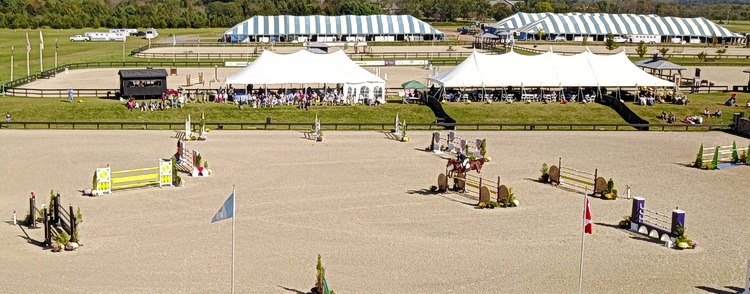
by Nancy Jaffer | Sep 18, 2024
Entries for U.S. Equestrian Federation-licensed shows were up 30,000 from 2022 to 2023, and figures for this year through July are on track for another projected increase, according to the federation’s CEO, Bill Moroney.
“Overall, our numbers are right where we wanted them to be at this point,” he said, noting the entries stood at 262,000 as of the end of July.
He was responding to comments made by Andrew Philbrick of Princeton Show Jumping in New Jersey, who canceled his last three shows of the season due to low entries. (Read the story about the cancellations on this link.)
“USEF horse show entries are down nationwide and profoundly down at many East Coast shows,” Philbrick contended as he announced the cancellations. He maintained that show “licensing is not transparent; it’s very hard to understand what the process is. I think we need to take a really hard look at licensing.”
He mentioned mileage exemptions given to shows in his region that are running against Princeton, but some of his shows also have needed and received exemptions because they are within the 125-mile limit of HITS in Saugerties, N.Y., and Old Salem in Westchester County, N.Y.
Moroney noted licensing procedures are spelled out in Chapter Three of the USEF rulebook.
“We follow the rules,” he maintained
Philbrick, a board member of USEF affiliate U.S. Hunter Jumper Association, had served on the USEF competition management committee at one time.
Part of the current situation on which Moroney and Philbrick agree is that competitors’ migration patterns have changed.
Philbrick cited FEI (international) shows in Michigan (Traverse City), Lexington, (Ky.), and Tryon (N.C.). drawing away customers from the Northeast, even though they are not within the mileage limits. He also mentioned “new and relatively new” FEI shows closer to New Jersey at Old Salem; Greenwich, Conn., and Silo Ridge in New York, in addition to HITS. as a factor in who attends his shows.
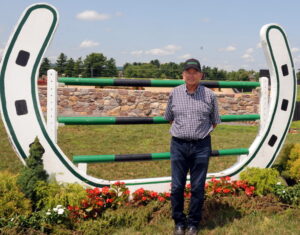
Andrew Philbrick of Princeton Show Jumping.
A change of management and investment that has led to major improvements in arenas and barns at HITS, about a 2-and-one-half hour drive from Princeton’s venue in Montgomery Township, for instance, has led to a slight disruption in the Northeast by drawing exhibitors who previously might have stayed closer to home or gone elsewhere.
The demand for FEI shows has grown exponentially, which also figures into the equation. The number of FEI shows in the U.S. is second only to the number held in France.
Princeton licenses between 18 and 20 national shows a year from April through October, according to USEF.
Riders and owners now are willing to travel further for a show that may have different offerings or atmosphere than where they usually compete.
“Value propositions speak to them,” said Katlynn Wilbers, USEF’s director of competition operations.
“The (customer) experience the trainers and the riders and everybody is getting is way more important now than it’s probably ever been in the past,” said Moroney, mentioning that also applies to the situations in which the grooms are working.
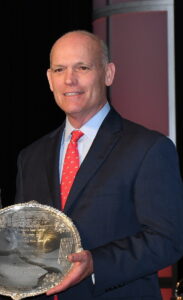
USEF CEO Bill Moroney.
“It’s a lot easier to write a check when you’re getting good value for your money,” he commented.
The stable of Olympic show jumping medalist Chris Kappler usually shows at Princeton, which he praised for good footing, fences and course designers.
“We haven’t been there this year because our shows have taken us further away,” Kappler said, but added about Princeton, “every time I’ve been, I’ve seen them as successful and doing well. So when I learned this (about the cancellations) I was a little bit surprised. The show has always been a very solid regional show.”
Another factor is that exhibitors are tending to change the dates they would normally show; they are willing to compete on weeks other than their usual pattern if it enables them to go to certain venues.
At the same time, people on social media are complaining that the costs of showing mean they can’t compete as often as they once did, or mentioning they prefer to save up for the experience of a special show, rather than going to certain other shows regularly as they once did. The one- and two-day shows in New Jersey that once were staged by boarding or lesson stables have diminished greatly as development has made incursions on the state’s equestrian scene and hurt the lower and middle end of the sport there..
The trend today, which has threatened one-week boutique shows, is toward multi-week shows where people can stay in a place for awhile instead of picking up and moving every week. That takes less effort and saves on horse transportation costs.
There are many more competitors today than there were at the time when USEF licenses were held by shows for three years. Now license renewal is annual, giving USEF an opportunity to judge the impact of exemptions.
Mileage between shows is not set in stone. USEF sees a greater need for diverse offerings to meet competitors’ needs. The mileage exemption process for shows applying for dates, on which the USHJA weighs in, was created to address density or lack of offerings in certain areas. Existing shows can offer input along with the affiliates and the USEF staff.
“People shop differently all the time,” Moroney observed.
In an era of change, he suggested that shows should survey their clients to see what they like and don’t like about a show, as well as what they are looking for when they decide where to compete, so adjustments can be made if necessary.
“If your business is dropping off, you try to find out why it it is,” he said.
“Our job in responsibly managing the calendar is making an effort to insure that our members have the diversity of venues they need and the diversity of offerings to develop their own skills as a rider and also to develop their horses’ skills That means sort of a mix of different levels of competitions,” Moroney explained.
by Nancy Jaffer | Sep 19, 2024
The country’s oldest horse racing track, Freehold Raceway, will stop operating Dec. 28. The half-mile track in Monmouth County, N.J.,, which opened in 1854, featured live racing for trotters and pacers, as well as simulcasting of races elsewhere.
“This was an extremely difficult decision, especially given the historical importance of Freehold Raceway to the local community and the New Jersey horse racing industry,” track general manager Howard Bruno said in a statement.
“Unfortunately, the operations of the racetrack cannot continue under existing conditions, and we do not see a plausible way forward.”
Freehold was acquired in 1998 by a joint venture of Penn National Gaming and Greenwood Racing, which also owns Parx Casino and Racing in Bensalem, Pa.
Freehold Mayor Kevin Kane said there had been persistent rumors that the track was in trouble.
“The raceway has a long and storied history in the Borough of Freehold but faced with declining interest in standardbred harness racing, the raceway’s fortunes went into a long, slow decline. Management seemed disinterested in promoting or marketing the venue and failed to capitalize on the advent of sports betting in New Jersey,” he stated.
Harness racing continues in New Jersey at the Meadowlands, which also has a short thoroughbred racing meet in conjunction with Monmouth Park, which offers thoroughbred racing through the summer.
Freehold is the third track to close in New Jersey since 2001, when Garden State in Cherry Hill shut down. Atlantic City Racecourse shuttered in 2016.

by Nancy Jaffer | Sep 15, 2024
Two days after the startling announcement that the Las Vegas qualifier for the Longines FEI Jumping World Cup™ was being cancelled two months before its scheduled November dates due to “unforeseen circumstances,” an explanation — sort of — for the decision has been revealed.
Stating it supports a change of management to the Desert International Horse Park team for the Las Vegas National Horse Show it began more than two decades ago, Blenheim EquiSports maintained in a press release issued Sunday morning that the switch will allow it to “put an even greater emphasis on producing a robust schedule of events at its home base, the Rancho Mission Viejo Riding Park in San Juan Capistrano,” Calif.
The show in Vegas Nov. 11-17 will run the Marshall + Sterling / USHJA National Championships, which previously were held alongside the World Cup qualifier and other international jumper classes at the South Point Casino Hotel. It also will feature the CPHA Foundation’s WCE Medal Final and the all-new IHSA/USHJA 3’3” Hunter Seat Medal Final.
Throughout the transition, Blenheim EquiSports promised to work “with the Desert International Horse Park to ensure a seamless changeover.” The Cup qualifier, for which EquiSports was given the rights through 2027, will not be a part of November’s show under the new management, however.

The USHJA Championships are a highlight of the competition year for many riders.
After apologizing to stakeholders for the sudden cancellation last Friday, the FEI stated it is evaluating the situation about the loss of a qualifier “and will prepare a proposal on the way forward, taking into account the calendar, sport and commercial implications, which will be presented to the FEI Board for their final decision.”
According to EquiSports’ release, “Immediately following the conclusion of the Blenheim International Jumping Festival (running this month at the Riding Park in San Juan Capistrano), construction will begin on the long-awaited environmental infrastructure project. This investment into the Riding Park will secure its legacy as `The Place to Jump’ on the West Coast in perpetuity.”
It has been a rough year for Blenheim EquiSports, which lost some dates for its shows due to water quality issues involving the Rancho Mission Viejo Riding Park For previous stories about the topic, click here and here.
On Friday, when EquiSports president Robert Ridland was asked for specifics on why the Cup qualifier was cancelled, he said “I cannot comment at this time.”
Ridland last month returned from Paris, where he guided the U.S. show jumping team to its third consecutive Olympic silver medal under his direction as chef d’equipe. His contract for that position is up for renewal at the end of this year; such contracts in the Olympic disciplines run with the Games quadrennium (four-year time frame).
After cancellation of the Cup qualifier raised the question about what would happen to the USHJA championships, it was quickly answered with word that the show will be produced by the Desert International Horse Park, led by Steve Hankin, with Pat Boyle continuing as show manager.
Explaining his decision to become involved with the championships, Steve said, “We’re excited to put on a great event in Vegas and continue to help build up the sport. We’re two months out from the event and we want it to be successful. We’re going to put in a lot of energy and focus on the event and the sport and that’s what we care about.”
Showing in Vegas is a highlight of the year for those qualifying for the USHJA Championships. Discussing working with Steve and Desert International Horse Park, USHJA President Britt McCormick commented, “Their expertise, coupled with Pat Boyle’s continued leadership, will elevate this year’s championships, allowing us to bring more opportunities to our competitors.”
Those include enabling the show to accept additional participants and showcase key competitions in slots previously reserved for the international-level show jumping at the venue. The Western Conference Equitation Finals will be the highlight on Saturday night, while the IHSA/USHJA 3’3″ Hunter Seat Medal Final West is the feature for Sunday.
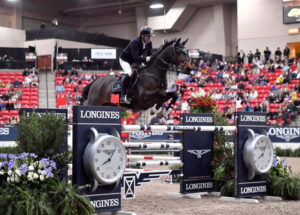
Conor Swail won the 2023 FEI World Cup qualifier in Las Vegas. (Andrew Ryback Photography)
Todd Hinde, the FEI director of jumping said, “We are deeply disappointed by the cancellation of the Las Vegas leg of the Longines FEI Jumping World Cup™ North American League.
“However, we respect the decision of the Organizing Committee and our priority now is to ensure the continued success of the series, providing top-level competition for athletes and fans across the remaining qualifiers.”
The Cup final will be held in Basel, Switzerland next April.
by Nancy Jaffer | Sep 21, 2024
The Paris Olympic eventer’s team reports Saturday, “We are grateful to share that Liz has been moved out of the ICU and is making steady improvements as she prepares to transition to inpatient rehab to begin her therapy. The road to recovery from a severe traumatic brain injury is long, but Liz is showing her incredible strength and resilience every day.”
Liz fell with her horse, Shanroe Cooley, last month on cross-country at the American Eventing Championships. While the horse was uninjured, Liz sustained a head injury and underwent brain surgery to relieve the pressure. She has made strides since and is now able to sit up and maintain eye contact.
The team stated, “We want to extend our deepest thanks to everyone who has reached out with messages of support and encouragement. Each note, photo, and video has brought immense comfort to Liz and her family and friends. We continue to read every message to her and show her the love pouring in from around the world.”
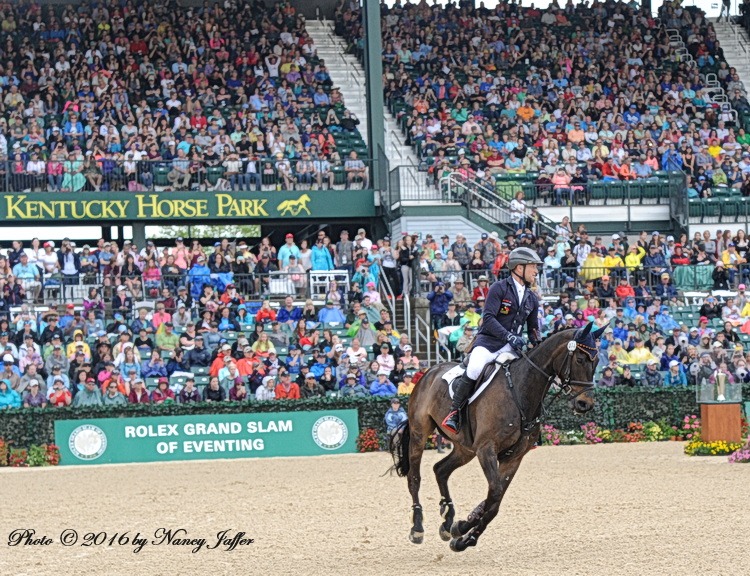
by Nancy Jaffer | Sep 19, 2024
The Rolex Grand Slam of Eventing is looking for another sponsor, as the watchmaker moves to focus on its show jumping involvement, having recently announced a new series in that discipline.
Developed in 1999 for the purpose of encouraging top competitors worldwide to come to what was then the Kentucky 4-star event as well as Britain’s Burghley and Badminton events, (all now 5-stars), the Grand Slam “ties the three majors together in a way that is meaningful for the competitors and makes it interesting for spectators,” said Jim Wolf of the Wolf Sports Group.
“It’s another talking point and newsworthy item for eventing. People follow it. It really is the top of the sport. It’s a very special series which we very much want to continue.”
In 2001, Rolex took over sponsorship of the Grand Slam, which has a $350,000 prize that goes to any rider who wins all three of the events consecutively, but in no particular order.
Testifying to the difficulty of that challenge is the fact that the Grand Slam been achieved only twice, by Pippa Funnell of Great Britain in 2003 and Germany’s three-time individual Olympic gold medalist, Michael Jung, in 2016.

Michael Jung in 2016 at what was then Rolex Kentucky with La Biosthetique Sam on his way to winning the Rolex Grand Slam of Eventing . (Photo © 2016 by Nancy Jaffer)
Jim was on the ground floor of developing the concept with the organizers of Burghley and Badminton when he was the U.S. Equestrian Federation’s executive director for sports programs. Jim continues to consult for USEF and administers the Grand Slam.
Those interested in discussing sponsorship can contact him at wolfsportsgroup@gmail.com.











